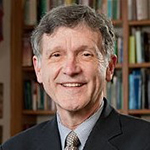 By Bill Leonard
By Bill Leonard
Jimmy Carter was president of the United States. Jimmy Carter has built Habitat for Humanity dwellings for 33 years. Jimmy Carter led the Carter Center in eradicating much of the Guinea worm plague in West Africa. Jimmy Carter is a (mostly) unashamed Baptist. Jimmy Carter teaches Sunday school at the Maranatha Baptist Church in Plains, Ga. Jimmy Carter has cancer.
Yet in announcing that he had contracted that dire emblem of mortality, and that it had spread throughout his body, the 90-year-old insisted that he would only “adjust” his schedule accordingly. An adjusted schedule is the most accommodation cancer is going to get from Jimmy Carter.
I first spoke with the former president in 1996 in a phone interview arranged by the Christian Century as part of a review the editors asked me to write for his book, Living Faith. Through that volume and the conversation, I learned something of what “centers” him then and now. We talked about the book’s focus, tracing the impact of Southernness and Baptistness on his life from the de facto integration of his Georgia-farm boyhood, through his naval and political careers, to his post-presidential “volunteer” service with the Carter Center.
We met face to face two years later when I joined a group of moderate, left-of-center former Southern Baptists for a discussion of ways to engage with more conservative, right-of-center Baptists still affiliated with the Southern Baptist Convention. The divisions among us were so great that even meeting together was problematic. So Carter held separate “summits” for each group, trying valiantly to hammer out a statement of cooperation for shared commitments to ministry, all to little or no avail. He had used similar methods in negotiating with Israelis and Egyptians to produce the Camp David Accords, an endeavor somewhat more successful than with the Baptists!
Undaunted by Baptist obstinacy, Carter again invited some us to partner with him in forming the New Baptist Covenant, a loose interracial coalition of Baptists aimed at “action, reconciliation and transformation” through “fellowship and cooperation.” The organization’s first convocation in Atlanta in 2008 drew some 15,000 persons, probably the largest multi-racial Baptist gathering ever held in the United States. In 2009, Carter spoke at each of five regional New Baptist Covenant assemblies including a two-day event held in Wait Chapel of Wake Forest University. He joined Charlotte pastors Clifford Jones and Amy Jacks Dean, Wake Forest Professor Maya Angelou and Divinity School student Matthew Johnson in addressing the group. The New Baptist Covenant continues to this day, working to link various Baptist groups in ministry and racial reconciliation.
Over the years, as a historian of the Baptists, I have become convinced that one cannot fully understand Jimmy Carter’s life, work and present response to cancer apart from the centrality of his faith and his diligence as a Sunday school teacher, a commitment he has maintained for over 70 years.
From the beginnings of the Republic, the faith of many presidential candidates has been questioned, overstated or trivialized by political rhetoric. Thomas Jefferson’s Federalist opponents labeled him a “howling atheist” in the campaign of 1800. Peter Cartwright, the Methodist circuit rider, branded Abraham Lincoln an “infidel” because he held no church membership. When Catholics Al Smith (1928) and John F. Kennedy (1960) ran for president, many Protestants predicted that if they were elected, the Pope would be running the country in no time.
Jimmy Carter’s claim to be a “born-again” Christian troubled secular and religious leaders alike. Certain liberals thought he should not speak of it in public, while some conservatives suggested he might not be “twice-born” at all. Jerry Falwell observed that Carter only “claimed” to be a Christian, and one Southern Baptist leader ended his White House visit by opining: “We are praying, Mr. President, that you will abandon secular humanism as your religion.”
Undaunted, Carter continued to teach Sunday school at First Baptist Church in Washington, as he did at Northside Drive Baptist in Atlanta while Georgia governor. He says he’ll keep teaching his class in Plains, cancer or not. I rest my case.
Carter writes that throughout his long life, his Christian faith has “provided the necessary stability,” then adds: “Come to think of it, stability is not exactly the right word, because to have faith in something is an inducement not to dormancy but to action. To me, faith is not just a noun but also a verb.” Perhaps that’s why he’ll work the cancer into his schedule, still hoping to work on another Habitat house in Nepal this November. For the ex-president-Sunday-school-teacher, faith, not cancer, remains the verb. Now and forever more. Amen.
Much of this essay appeared in the Winston-Salem Journal on Aug. 23.
